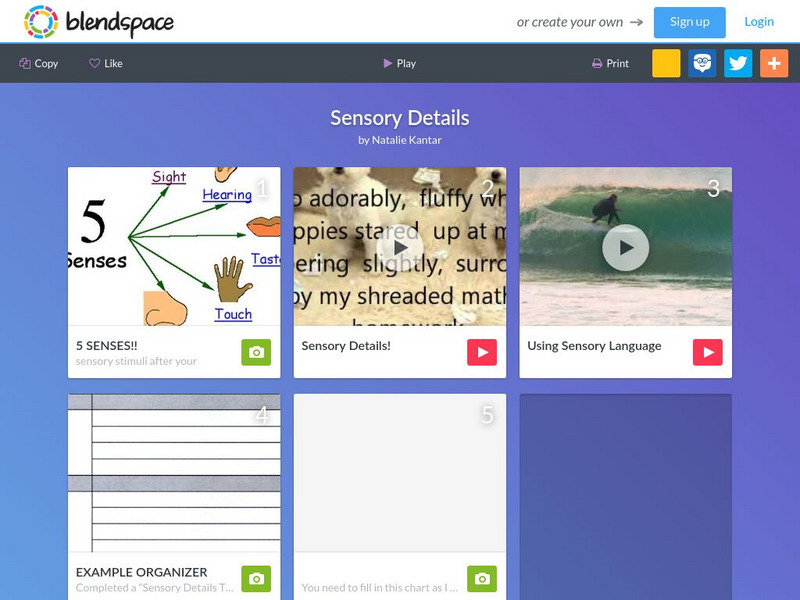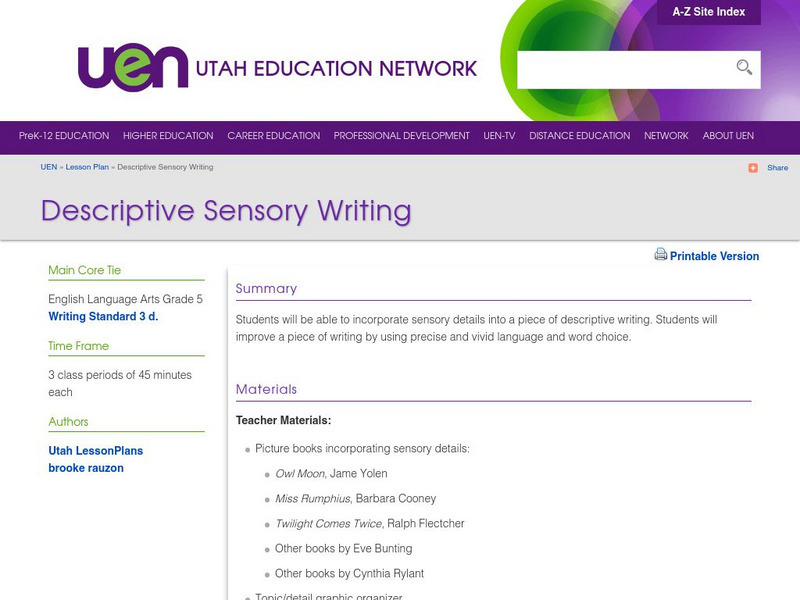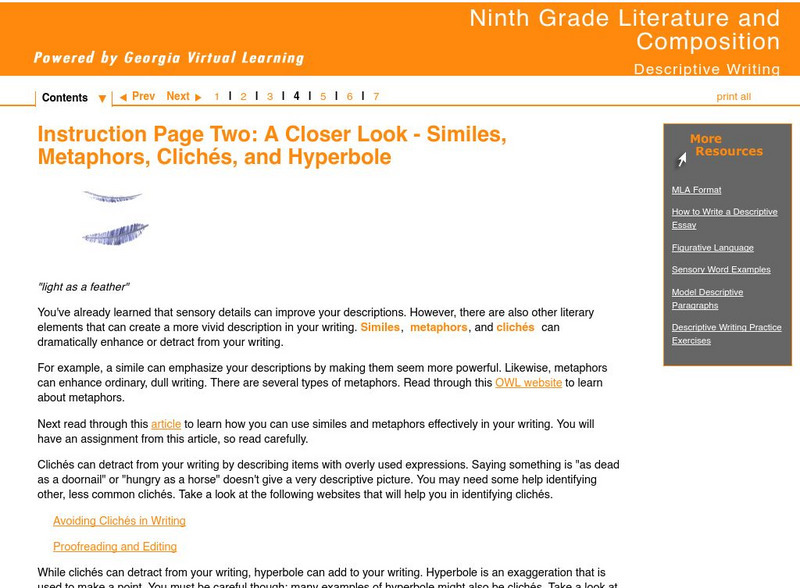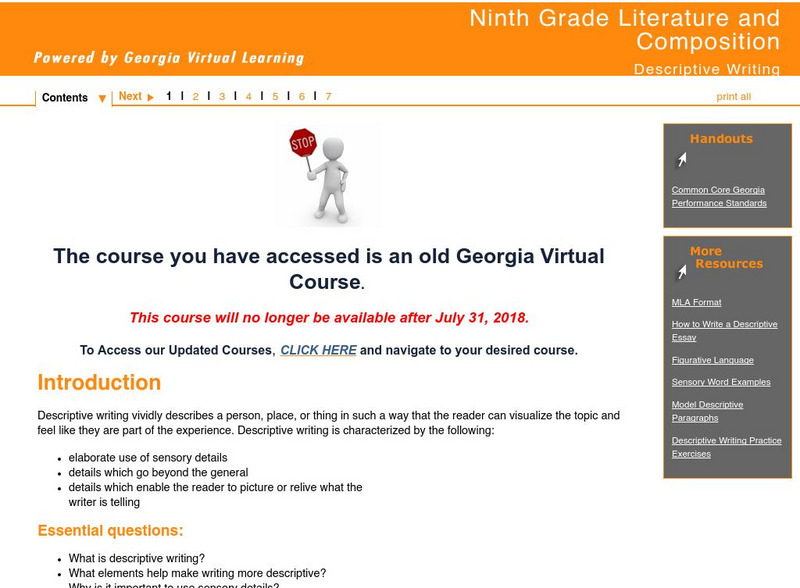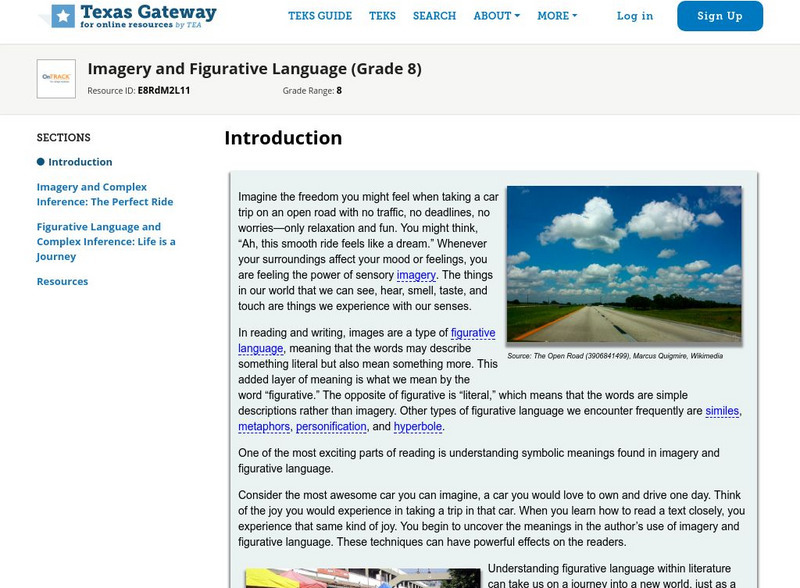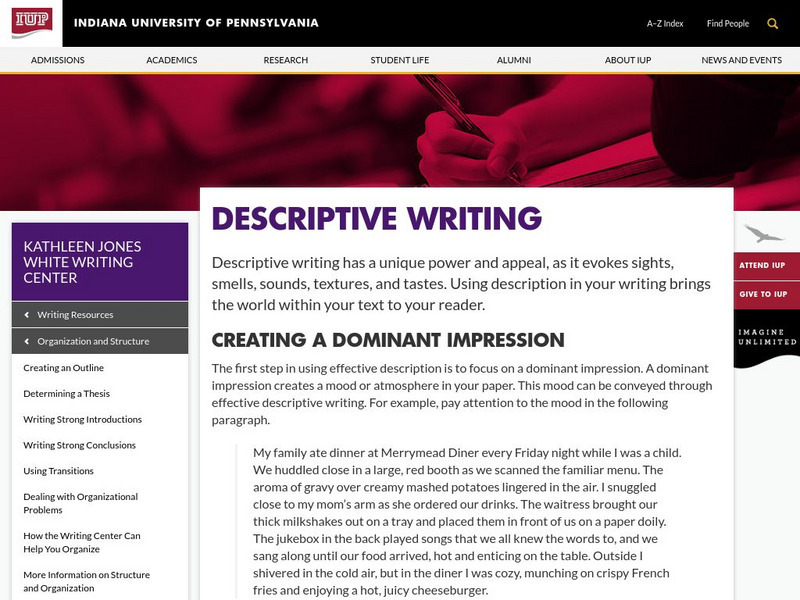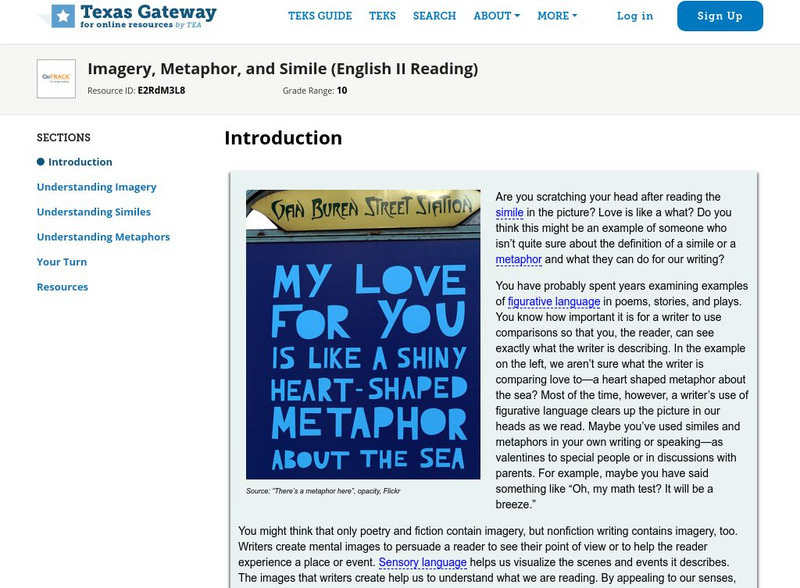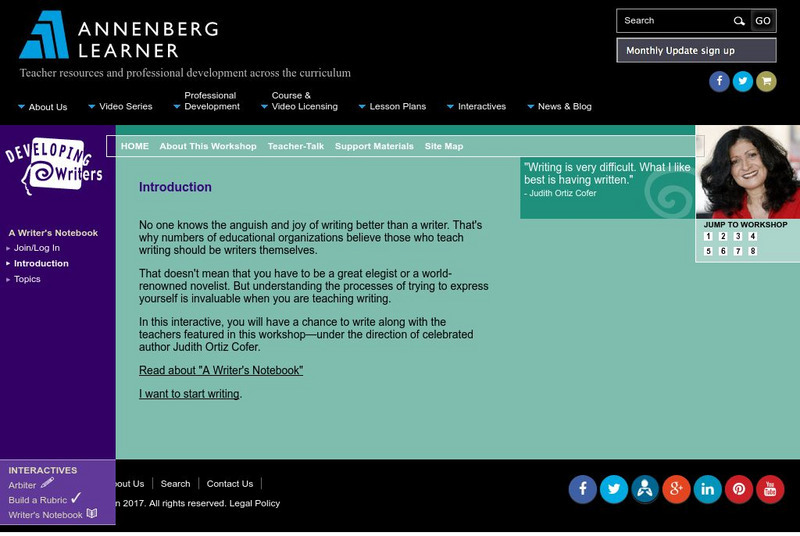Curated OER
You Be the Critic!
Students review several pieces of art and choose one that inspires them. They research the artist and his or her contributions to art and then recreate the artwork and compare their copy to the original.
Other
Ms. Jordan Reads: Teaching Sensory Language With Mentor Texts
This instructional activity on sensory language revolves around the descriptive book "Where Butterflies Grow". Students will learn how sensory language connects to the five senses, learn a sensory language chant, understand the purpose...
Better Lesson
Better Lesson: Developing Characters and Experiences With Sensory Language
Adding sensory languages makes your writing so good you can see, hear, smell, taste and touch it. This lesson will show you how to use descriptive sensory language in order to develop and capture the experiences and characters in a...
Texas Education Agency
Texas Gateway: Imagery and Figurative Language (English 7 Reading)
This lesson, focuses on three ways to use figurative language: to create imagery, to appeal to the senses (using sensory detail), and to suggest mood.
Other
Study.com: How to Use Descriptive Details & Sensory Language in Your Writing
When you write a narrative, you can draw your reader into your experiences by adding specific, concrete details and sensory language to your storytelling. This lesson tells you exactly how to do it. W.9-10.3d Precise/sensory details,...
Alabama Learning Exchange
Alex: Marshmallow and Pretzel Sensory Writing
This language arts lesson plan applies hands-on materials to help students apply the sensory details need for writing. It also incorporates writing skills for comparing and contrasting. In addition, students will utilize Thinkfinity...
TES Global
Blendspace: Sensory Details
A five-part learning module with links to images and videos about sensory details and using sensory language.
CPALMS
Cpalms: Reading With Our Eyes, Fingers, Toes, Ears and Nose
[Free Registration/Login Required] In this lesson, students are learning to identify sensory words in their reading, specifically in poetry. Students will gain a perspective on how authors use sensory words to portray their ideas. They...
Utah Education Network
Uen: Descriptive Sensory Writing
In this lesson, 5th graders will engage in descriptive writing. Students will improve a piece of writing by using precise word choices that are full of sensory word choices.
Georgia Department of Education
Ga Virtual Learning: Descriptive Writing: Similes, Metaphors, Cliches, Hyperbole
This lesson focuses on figurative language used in descriptive writing including similes, metaphors, cliches, hyperbole. It offers multiple links to websites pertaining to figurative language in descriptive and creative writing; an...
Writing Fix
Writing Fix: Colorful Sensory Poems
This lesson plan allows students to explore color - both in literal and figurative terms. Students will read books about color, discuss the emotion involved with color, and incorporate color metaphors to write poems using the graphic...
Texas Education Agency
Texas Gateway: Imagery (English Iii Reading)
In this lesson, students will learn how writers use words that allow them to create pictures in their heads. When a writer uses sensory details or words that appeal to our senses, then we are able to use our senses and our memory to...
Georgia Department of Education
Ga Virtual Learning: Ninth Grade Literature and Composition: Descriptive Writing
This lesson focuses on descriptive writing including discussing what it is and the chararacteristics. It provides links to the web articles: "How to Write a Descriptive Essay," "5 Model Descriptive Paragraphs," "MLA Formatting and Style...
Texas Education Agency
Texas Gateway: Imagery and Figurative Language
In this lesson, you will learn how to make complex inferences and use textual evidence such as imagery and figurative language to support understanding.
Other
Tesol: Sensory Details Worksheet: Adding Details Add Interest
Use this worksheet to practice enhancing your writing by using sensory language. Sensory details include words that describe sights, sounds, and smells of the setting, characters, and interactions.
Other
Indiana Univerisity of Pennsylvania: Writing Center: Descriptive Writing
This website from the Writing Center at Indiana Univerisity of Pennsylvania focuses on descriptive writing. It includes discussion and examples of the following: Creating a dominant impression or mood, using sensory details, using vivid...
Other
Story md.com: Infant and Newborn Development
When will my baby take his first step or say her first word? During their first year, babies start to develop skills they will use for the rest of their lives. The normal growth of babies can be broken down into the following areas:...
Writing Fix
Writing Fix: The Sum of Its Parts
Inspired by Julianna's understanding (from the novel Flipped by Wendelin Van Draanen) that "A painting is more than the sum of its parts," learners will describe a memorable place that evokes a certain feeling or emotion. Students will...
Sophia Learning
Sophia: Writing Narratives
Notes, a PowerPoint presentation, two videos, a song, an exercise, and a game help students to understand how to write a narrative. Elements of a narrative as well as the use of figurative language and sensory images are introduced and...
Texas Education Agency
Texas Gateway: Literary Text: Imagery, Metaphor, and Simile
Writers use sensory imagery ("smelled the salty air"), similes ("like a strong man playing tug-of-war"), and metaphors ("the waves roaring in my ears") to capture the reader's imagination. In this lesson, you will learn how to identify...
Alabama Learning Exchange
Alex: Wordly Wise
Students will learn how to use better word choices by completing a cloze activity, listening to A House for Hermit Crab by Eric Carle, and completing a word web.
Georgia Department of Education
Ga Virtual Learning: American Literature: Modernism: William Carlos Williams
This lesson focuses on William Carlos Williams and his poems using images of everyday life including "The Red Wheelbarrow" and "This is Just to Say."
Alabama Learning Exchange
Alex: Peanut/peanut Butter
During this instructional activity students navigate the Internet to learn about the accomplishments of George Washington Carver. Students explore the history of peanuts and sample different types of peanuts. They use their five senses...
Annenberg Foundation
Annenberg Learner: A Writers' Notebook
Virtually participate in a workshop of four high school teachers led by a renowned author. There are eight topics including "Hiding and Revealing with Language," "Using Sensory Description," and "Writing a Picture of Me".








